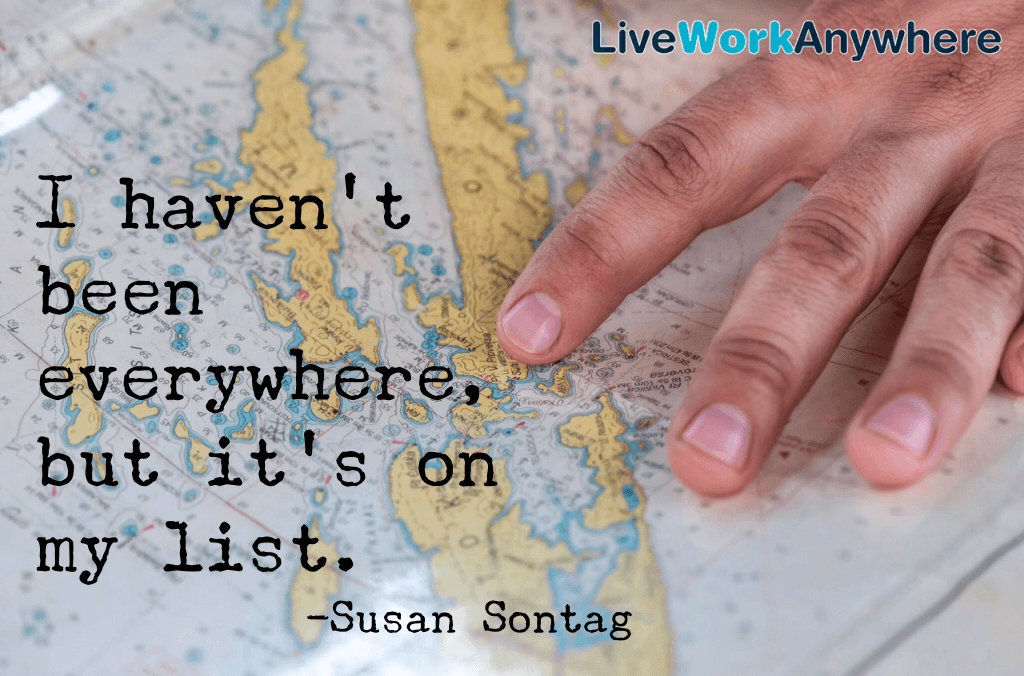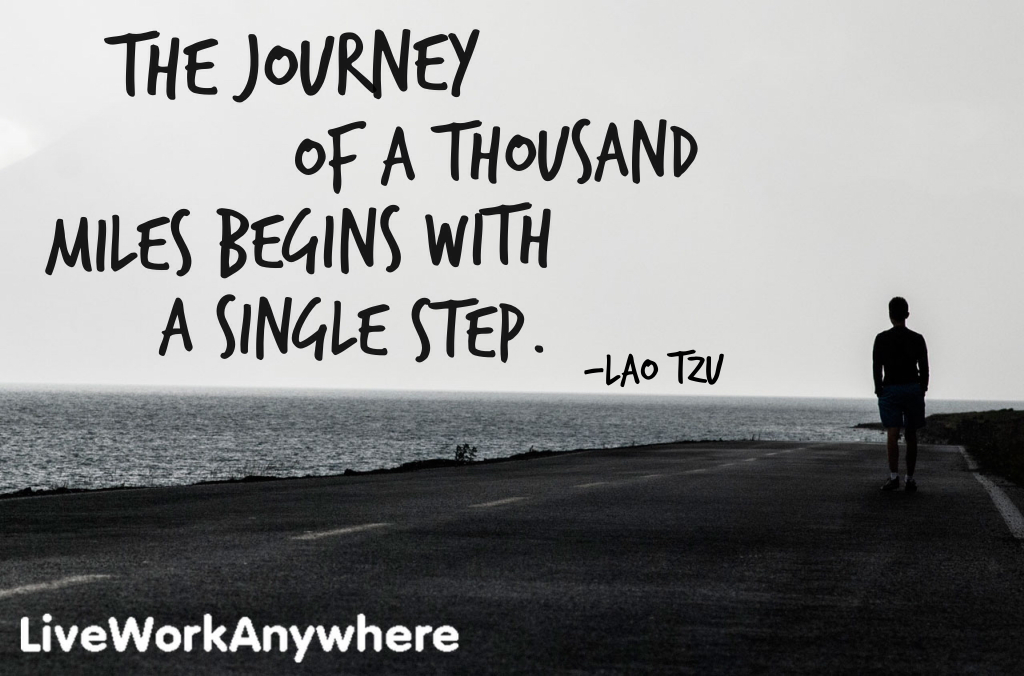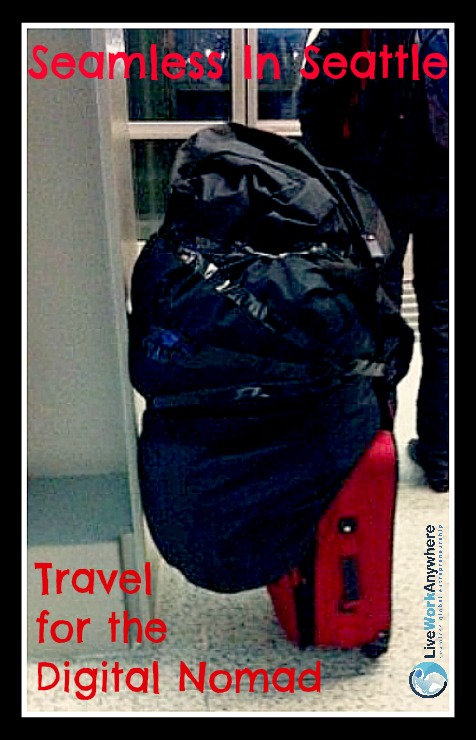WiFi is the lifeblood of any digital nomad, but it’s often the most challenging to access. After all, how will you stay connected with your clients and deadlines if you don’t have a reliable internet connection? That said, though, finding good signal can be challenging even in more developed areas like cafes or hotels. Meanwhile, that becomes downright virtually impossible when you travel to remote villages. This is where mobile hotspot devices come in.
Best Portable Wifi Hotspot Devices for Traveling and Working Remote [2022]
For digital nomads and remote workers, stable internet access is a must. Whether you’re working on a laptop at a cozy coffee shop or trying to get some tasks done on your mobile phone during your commute, being able to connect to the world wide web is a gamechanger when it comes to productivity.
Mobile hotspot devices provide a great option to ensure a reliable internet connection. These devices create a small wireless network that you can connect to with your devices.
As a digital nomad, you may benefit from mifi device features such as a battery-saving mode and the ability to connect to multiple devices simultaneously. You can gain a more in-depth understanding of global wifi and mobile hotspots in our Ultimate Internet Guide for Digital Nomads.

Mobile hotspot devices can connect more than your laptops to the internet. These can also work just fine with your tablet, camera, and pretty much any gadget that’s wi-fi enabled. These can support multiple connections better compared to your phone’s mobile wifi hotspot mode as well as ensure that you don’t drain your phone battery.
In certain countries where cellular coverage might pose a problem and you might be worried about getting a secure connection, you can hook up these portable wifi hotspot devices to antennas to achieve better internet connection.
When looking for a mobile hotspot for digital nomads, keep the following factors in mind:
Battery life
A vital consideration when it comes to choosing a mobile hotspot device for international travel is battery life, which can range from lasting a full day on a single charge to a measly few hours. Some devices provide extra portable batteries, while others allow you to even use the mobile hotspot as a powerbank.
Determine your expectations about your wifi connection. If you plan to use the internet all day long and need to be constantly connected to search for restaurants or museums, you might need a mobile hotspot device with a longer battery life. Meanwhile, if you don’t really need wifi connection for the entire day or only need WiFi for a handful of hours, then splurging for an extra battery might not be worth it.
Budget and data allowance
The price of the device isn’t the only consideration when it comes to portable WiFi for travel. Depending on your provider and chosen mobile hotspot plan — whether you’re opting for international roaming plans or buying a local sim card when you visit other countries — you will probably have a limited use rate monthly or even daily. On top of your general mobile plan, this will also determine how much data you can use. This would also most likely affect your data speed.
If you’re under a tight budget, you should figure out how to compromise with regard your plan’s speed or data cap. Generally, though, the longer you avail of the hotspot plan, the lower the costs.
Size and weight
Mobile hotspot devices need to be exactly that: mobile. Your device needs to be portable and easy to pack. While opting for the more compact devices is the norm these days, the decision is dependent on your needs and how you envision your days.
If you’re mostly on the move, particularly on foot or use public transport, then choosing a smaller mobile hotspot device for international travel would be better for your needs. On the other hand, if you’re one of the remote professionals who plan to use the wifi device for business or corporate trips and have remote jobs requiring you to spend most hours in a single location, then a bigger hotspot device that offers longer battery life or a portable battery would benefit you more.
Check out our list and find the best mobile hotspot that suits your needs.
Best overall mobile hotspot: Skyroam Solis X
Skyroam Solis X is a new addition to the Skyroam family of mobile hotspot devices. This Skyroam device is different from its predecessors. This sleek little gadget, which basically looks like an orange puck, offers lightning-fast wifi speeds, allowing you to stay connected anytime, anywhere. Plus, the Skyroam Solis X comes equipped with a built-in power bank to keep your devices charged while you’re on the go. Simply plug your gadget in the allotted USB port, and you’re good to go.
The Skyroam Solis X wifi Smartspot sold out within the first day of its release. In fact, there were overwhelming positive Skyroam Solis X wifi Smartspot reviews from those who were able to get their hands on one. Now that the Skyroam Solis X wifi Smartspot is back in stock, I decided to take a closer look at this Skyroam device and see if it lives up to the hype.
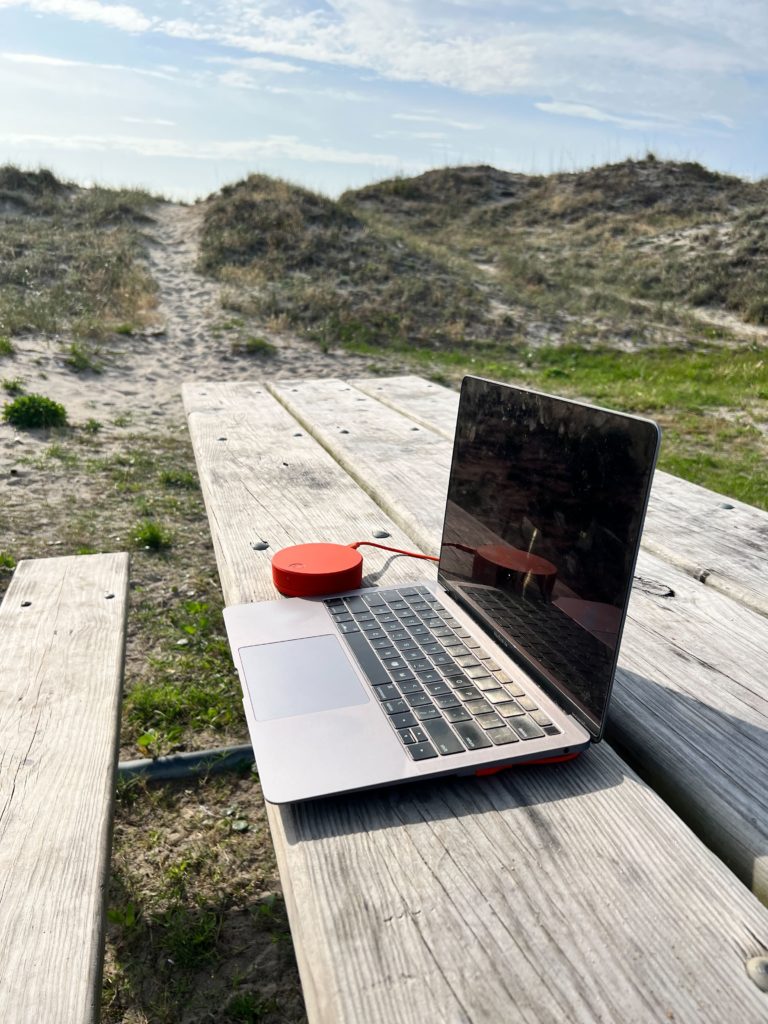
The power button can be found at the top part of the device. A white stripe serves as the indicator for your remaining battery life, while three blinking indicator lights will tell you whether you have a good data connection.
One side of the Solis X is equipped with an 8MP camera, while the other side holds the USB-C port that you use to charge the mobile hotspot and connect your gadgets when you need a powerbank. While this is a great feature, one concern is that the powerbank can be very slow in charging your gadgets.
At the bottom, you can find a QR code. Scanning this will lead you to the Solis app, which you can connect to your smartphone. If that’s not enough, the Skyroam Solis X’s LED display can also be used as a flashlight or an emergency beacon.
Skyroam offers multiple plans depending on your needs, ranging from a single day pass to month-long contracts with unlimited data. Check out the pricing plans here.
The expected battery life for the Skyroam Solis X is 18 hours, but it only lasted roughly 10 hours when I used it. Considering that I tested it by connecting my two smartphones and laptop while also using it as a powerbank, this is pretty impressive.
With that in mind, one thing I found challenging with the Skyroam Solis X is the design of its charging port. The USB-C charging port for this device has a tiny ridge that makes it incompatible with many types of USB-C cables. Skyroam solves this issue, though, by including a USB-A adapter in the package.
After testing the Skyroam Solis X wifi Smartspot, I can say that it is an impressive device that offers excellent value for its price. Although it doesn’t come with a rental option, this device works in more than 130 countries covered. So, the Skyroam Solis X can be considered a worthy investment for digital nomads.
Best no-frills mobile hotspot: Skyroam Solis Lite
For those who don’t need the bells and whistles offered by Skyroam Solis X, there’s Solis Lite. Like the Solis X, this portable wifi device can also support up to 10 devices. It’s also small enough to easily fit in your pocket and weighs roughly the same as a regular smartphone. Considering that this gadget offers a rental option starting at $9 per day, this is a great alternative for those who want a no-frills Skyroam device.
It has the same look as the Skyroam Solis X, including the convenient QR code at the bottom for the mobile app and the problematic USB-C charging port that makes it challenging to use third-party cables. It also works as a powerbank, but likes the Solis X, it charges devices quite slowly at 5V/1A.
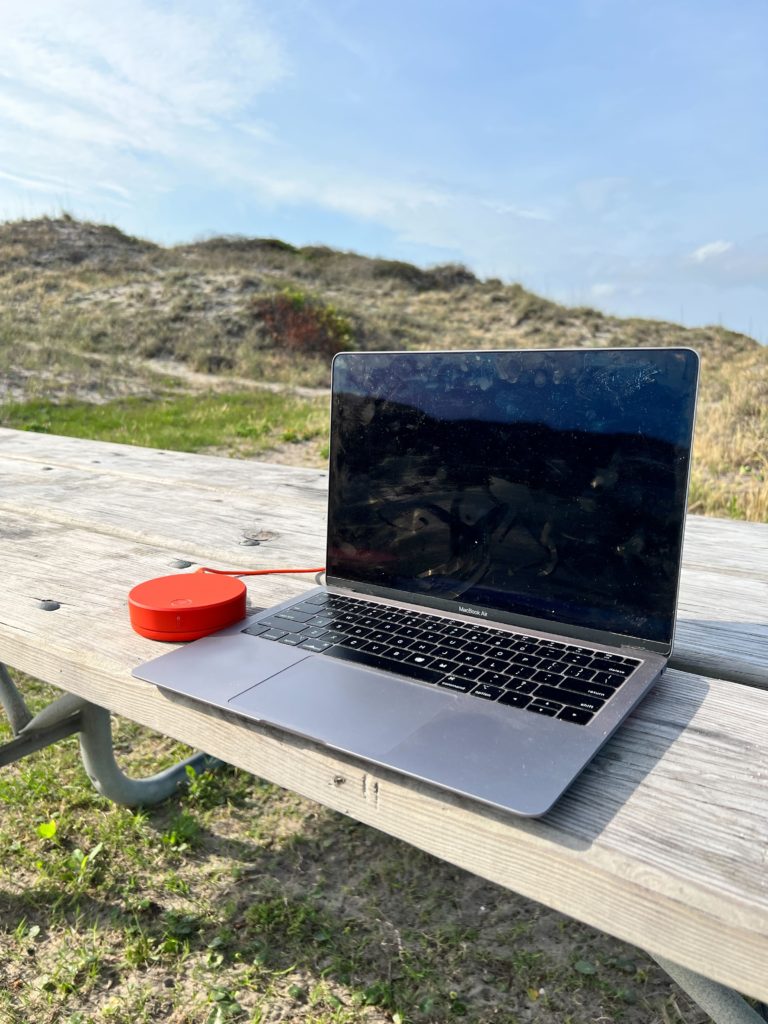
What differentiates the Solis X from the Solis Lite is the absence of the remote-enabled camera, speaker, and microphone, which are used for the built-in smart assistant. That means the Solis Lite is simply your basic international hotspot device with no special features and focuses solely on providing internet access. Truth be told, I didn’t really miss the smart features of the Solis X and actually prefer this option for my digital nomad needs.
Best 5G mobile hotspot: NETGEAR Nighthawk M5
NETGEAR’s Nighthawk M5 5G Mobile Hotspot Pro is one of the latest mobile hotspot devices to hit the market. NETGEAR is known for its high-quality router products, so I was curious to see how its portable wifi device would perform. The Nighthawk M5 5G Mobile Hotspot Pro did not disappoint. The device is easy to set up and use, and it offers fast reliable connectivity. I was also impressed by the Nighthawk’s battery life; I was able to use it for several hours before needing to recharge.
Theoretically, 5G can go as fast as 10 to 50 Gbps, but that’s a long way off. 5G mobile broadband should be 11 times faster than 4G if the signal is strong enough. However, there’s a catch: the Nighthawk M5 will only run at 5G speeds if you have a strong 5G signal. If you are in an outlying area, you may only get 3G or 4G speeds.
In real-world testing, I was able to consistently get speeds in excess of 100Mbps on both bands. The Nighthawk M5 also supports up to 32 concurrent connections, so you shouldn’t have any trouble connecting all your devices. It’s ideal for teams or small groups.
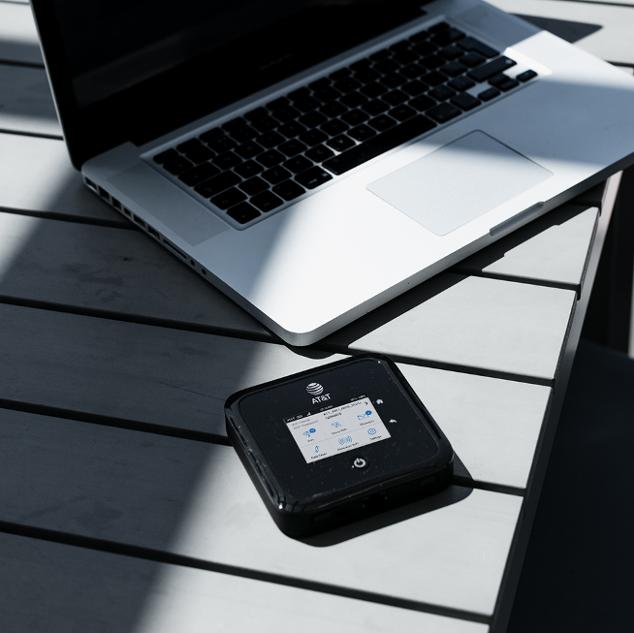
One of the best features of the Nighthawk M5 is its battery life. NETGEAR claims that the Nighthawk M5 can last up to 13 hours on a single charge. In practice, I discovered that this varies greatly; Wifi-6 and 5G / LTE are simply power hogs. Nonetheless, a realistic time frame of 6 to 9 hours is still good value.
However, what makes the Nighthawk M5 stand out is the fact that it’s the first C-Band hotspot in the US. Let me offer a bit of context to explain why this is a great feature. While the services of the 5G networks aren’t exactly noticeably faster than 4G networks these days, this situation will change in the coming years. When this happens, you will need a C-Band gadget to be able to take advantage of the additional capacity.
Actually, the iPhone 12 and up phones, the Samsung Galaxy series starting from the S21, and Google Pixel 5 and above are already using C-Band. Before the Nighthawk M5, no mobile hotspot has ever supported this technology.
All these features come at a steep price of $699.99. This is generally more expensive than most mobile hotspot devices and plans.
Before you get one, make sure to check the model you’re buying. The US version doesn’t seem to support 5G outside North America, which means it’ll only work as a 4G hotspot abroad. According to Netgear, this hotspot device is most compatible with AT&T and T-Mobile. If you get the international version, you’ll be able to take advantage of a different group of 5G bands in most countries.
Best plug-and-play mobile hotspot: GlocalMe Mini Turbo Wi-Fi Hotspot
You can say goodbye to expensive international roaming charges and spotty public Wi-Fi with the GlocalMe Mini Turbo Wi-Fi Hotspot. This handy little device offers fast connection and dependable LTE coverage in over 140 countries, making it an indispensable travel companion for the modern digital nomad.
I had never used a touchscreen portable wifi before the GlocalMe G4 Pro Smart 4G Mobile Global Wi-Fi Hotspot. The previous mobile hotspots I used made the apps linked to the devices indispensable, which means I needed them whenever I had to check my remaining data or battery life. This made this particular mobile hotspot different. All those information are readily displayed on the 5-inch touchscreen of the GlocalMe G4 PRO as well as in its user friendly app.
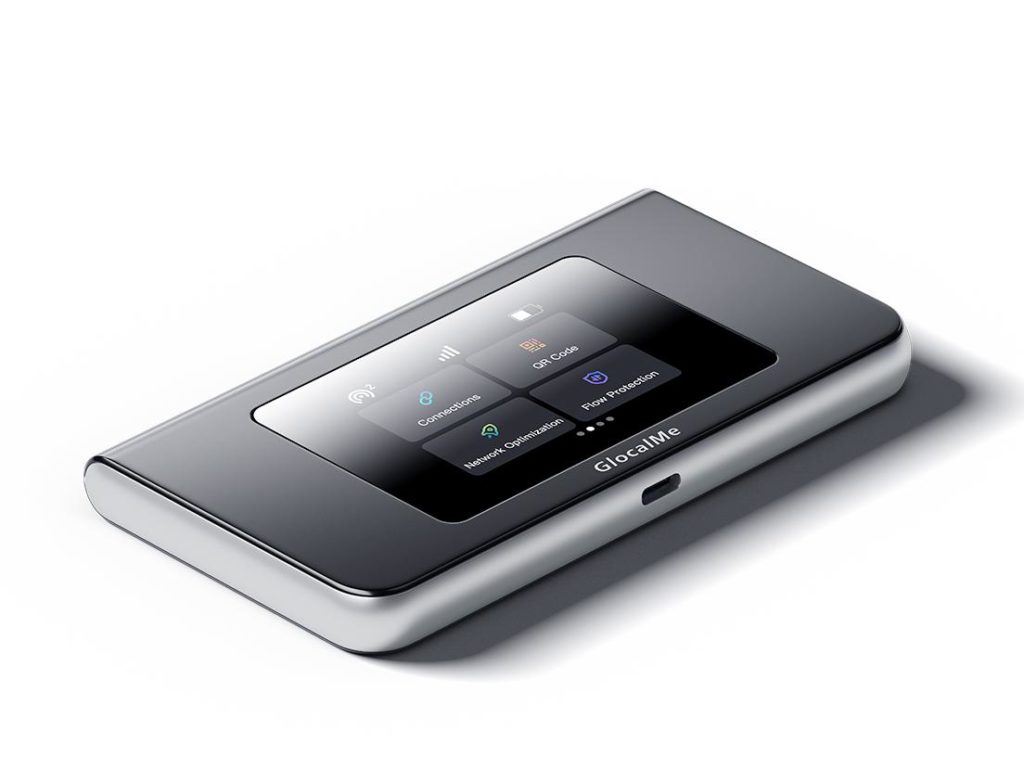
The touchscreen makes it easy and convenient to add data. Plus, it already has Google Maps, voice recognition translator, and TripAdvisor installed. Its straightforward interface and limited but essential options almost feel like a user-friendly apps on my smartphone, so there is an innate comfort in using it to set things up.
The GlocalMe Mini Turbo is also extremely simple to use; just insert a SIM card and connect up to 10 devices to the hotspot. With a battery life of up to 10 hours, you can be confident that you’ll always have a reliable connection, even on long trips.
Best unlocked mobile hotspot: Huawei E5576-320 Portable 4G
The Huawei E5576-320 Portable 4G is one of the low-cost options for mobile hotspot devices on the market. I was curious to see how this device would perform and how it would compare to the more expensive options, so I decided to put it to the test. I have to say, I was impressed with the Huawei E5576-320 Portable 4G.
With 150Mbps download speeds and 50Mbps uploads, this is a great mobile hotspot option that’s tiny, lightweight, and easy to transport. You can also connect up to 10 devices to this 4G mobile router, which has a standby time of 350 hours and a working time of 6 hours, thanks to its 1500mAh battery.

The Huawei E5576 was easy to set up and use, and it provided a reliable connection even in areas with poor cell coverage. Unfortunately, this device only works in Asia, Africa, the Middle East, and Europe. For countries outside this list like the US, Canada, and Mexico, you’ll need to get a separate Huawei hotspot device.
Overall, the Huawei E5576-320 Portable 4G is relatively affordable, making it a great option for budget-conscious digital nomads. Like the Skyroam Solis Lite, the Huawei E5576-320 Portable 4G is simply a no-frills low-cost mobile router. Basically, this mobile hotspot device focuses solely on connecting your gadgets to the internet, no matter where you are.
Best mobile hotspot for remote areas: Verizon Jetpack MiFi 8800L Wi-Fi Hotspot
Verizon’s Jetpack MiFi 8800L is one of the best mobile hotspot devices on the market. Like the previous models, this one also comes in matte black and gray and is a plastic oval that’s about the size of a deck of cards with a touchscreen front. It has two external antenna ports plus a USB-C port.
It can connect up to 15 devices at once and has a built-in battery that lasts up to 15 hours. On top of these, the Jetpack MiFi 8800L also works great for digital nomads who want to explore extremely rural areas. This is because unlike other units that can only see 3G in these remote places, Verizon’s wifi hotspot can actually still offer 4G LTE.

If you’re worried about data overage charges, don’t be – Verizon offers unlimited data plans for Jetpack MiFi 8800L devices. So whether you’re working on the go or just want to stay connected while traveling, Verizon Jetpack MiFi 8800L is the perfect solution.
Best low-cost prepaid mobile hotspot: ZTE ZMax Connect MF928
As long as you have a compatible AT&T or T-Mobile prepaid service plan, you can use the ZTE ZMax Connect MF928 hotspot. Like most low-cost mobile hotspots, this device also comes in the form of a tiny black box that’s roughly the size of a playing card. Unlike the more expensive options like the Skyroam Solis X, it has no dedicated indicator for battery life or signal strength.
However, the ZTE ZMax Connect MF928 offers a special feature. It has a pair of TS9 antenna ports, which could be used to attach an external antenna to boost the signal. Its LTE covers AT&T and T-Mobile but doesn’t include Verizon and other foreign providers. Moreover, the hotspot’s internet speed tends to flounder when it reaches LTE performance. It becomes more problematic when additional you try to add more than two devices at a time, with the issue being more obvious when you’re having Zoom calls.

I appreciate the wifi management options, though. I like the accompanying mobile app, which sends me updates on data usage and allows me to tweak the hotspot’s settings.
The ZMax Connect MF928 supports up to 10 devices at a time and can last up to 10 hours, making it ideal for international travelers and digital nomads who need to work remotely while on the road. Overall, the ZTE ZMax Connect MF928 is a great option for those who need a reliable and affordable mobile hotspot device.
How to maximize your mobile hotspot plan
Mobile hotspot plans evolve all the time. If you add a hotspot data plan to an existing “unlimited” phone plan, Verizon gives you up to 50GB of high-speed data, 40GB from AT&T, and 40GB from T-Mobile. Once you consume that, the carriers tend to “deprioritize” your data or start to throttle it randomly.
So if you’re an AT&T or Verizon subscriber, the best way to make the most of your mobile hotspot data plan is to add your hotspot line as a separate line to your pre-existing phone plan. That offers you the most data for your budget.
Reality check
Admittedly, some of the devices listed here are pretty old. That’s because mobile hotspots have not exactly progressed as quickly as other technologies. While I’m not thrilled over this lack of innovation, I’m still grateful that these mobile internet devices are available to make our lives easier. However, I’m hoping to see more wifi hotspots with the most advanced 5G technologies out in the market soon and making our digital nomad life easier and more convenient!
Conclusion
Talking about portable hotspot devices brings back memories, particularly one that started out cold and daunting. I was driving around the Ring Road in Iceland when the roads got narrower and icier. Everything was foggy, and I had no idea where I was since I couldn’t see anything. I couldn’t tell where I was going. Eventually, I realized that I had been driving in circles for hours on end, and it felt like there was no way out.
Thank goodness I had my mobile hotspot device with me, which turned out to be a lifesaver. I used it to help me navigate the Ring Road. The fact that I had something with me that allowed me to still be able to communicate with my family and friends as well as help me navigate the unknown place offered me an invaluable sense of comfort and relief.
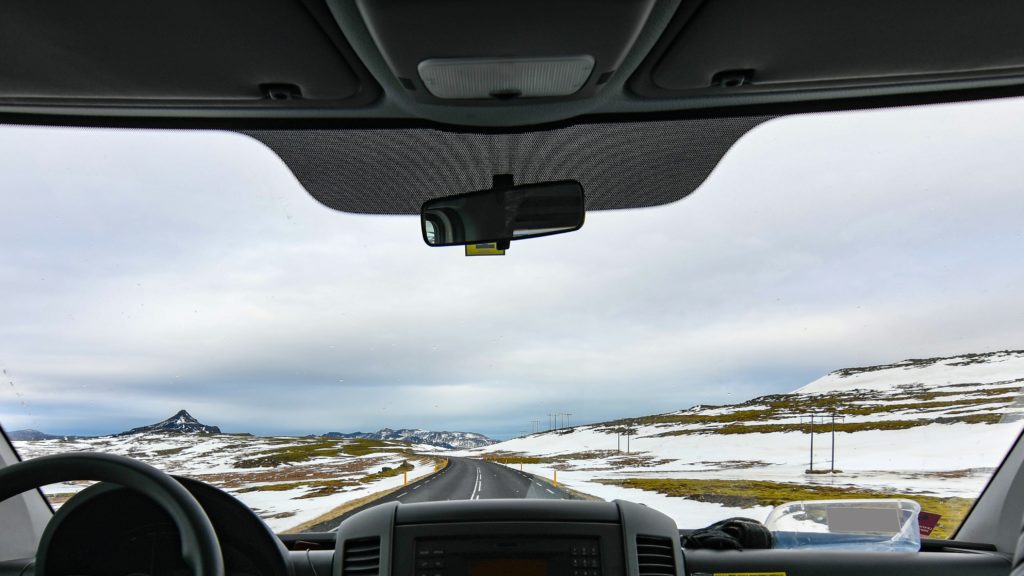
Truth be told, I would have felt a lot less safe traversing that road in Iceland without my mobile hotspot device. It just felt better because I knew I could rely on something in case of emergencies–or in this case, led me to a spectacular town with hot springs that soothe my frayed nerves and sore muscles.
These days, it’s hard to imagine life without the internet. Whether I’m working from a cafe in Barcelona or a hotel in Bali, I need to be able to stay connected. Plus, mobile hotspot devices have been a lifesaver. On more than one occasion, I’ve been out and about without any wifi, only to find that my mobile hotspot device has come to the rescue.
I’ve also used mobile hotspot devices to stay connected when travelling through remote areas where there is no cell service. So if you’re looking for a way to stay connected while on the go–whether you’re trying to check directions, find a nearby restaurant, or just stay connected with friends and family–I highly recommend investing in a mobile hotspot device. You’ll never know when you’ll need it!








